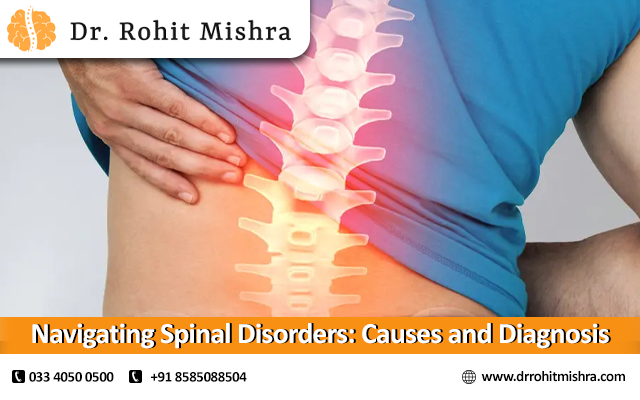The spine is a vital human body component, providing structural support and facilitating movement. However, various factors can lead to spinal disorders, causing pain, discomfort and mobility issues. Understanding the causes and diagnosis of spinal disorders is crucial for effective treatment and management. Dr. Rohit Mishra is the best neurosurgeon in Kolkata, shedding light on this critical topic to help patients navigate their spinal health journey.
What Are Spinal Disorders?
Spinal disorders encompass various conditions that affect the spine, including the vertebrae, discs, nerves and surrounding tissues. These disorders can arise from multiple factors, such as injury, ageing, poor posture, degenerative changes or underlying medical conditions. Common spinal disorders include:
·Herniated Disc: When the soft inner core of a spinal disc protrudes through the tough outer layer, causing pressure on nearby nerves.
·Spinal Stenosis: Narrowing of the spinal canal, leading to spinal cord and nerve compression.
·Scoliosis: Abnormal sideways curvature of the spine, often occurring during growth spurts in adolescence.
·Degenerative Disc Disease: is the wear and tear of the spinal discs over time, which results in pain and reduced flexibility.
·Spinal Tumours: Abnormal growths can develop within the spinal cord, nerve roots, or surrounding tissues.
Causes of Spinal Disorders
Spinal disorders can have diverse causes, ranging from acute injuries to chronic degenerative changes. Some common contributing factors include:
·Trauma: Accidents, falls, or sports injuries can cause fractures, dislocations or soft tissue damage to the spine.
·Age-related Changes: As we age, the spinal discs lose moisture and elasticity, leading to degeneration and increased risk of disc herniation and stenosis.
·Poor Posture: Prolonged sitting, slouching, or improper lifting techniques can strain the spine and contribute to developing spinal disorders.
·Genetic Factors: Some spinal conditions, such as scoliosis, may have a hereditary component, with certain genetic factors increasing the risk.
·Medical Conditions: Conditions like arthritis, osteoporosis and spinal infections can affect the spine’s health and increase susceptibility to disorders.
Diagnosing Spinal Disorders
Early and accurate diagnosis is essential for effectively managing spinal disorders and preventing complications. Dr. Rohit Mishra employs a comprehensive approach to diagnose spinal conditions, which may include:
·Medical History Review: Gathering information about the patient’s symptoms, medical history, lifestyle factors, and any previous injuries or treatments.
·Physical Examination: Assessing posture, range of motion, reflexes, muscle strength, and sensation to identify signs of spinal dysfunction.
·Imaging Tests: Utilizing advanced imaging techniques such as X-rays, MRI scans, or CT scans to visualize the spine’s structures and detect abnormalities.
·Nerve Tests: Conducting electromyography (EMG) or nerve conduction studies to evaluate nerve function and identify any nerve damage or compression.
Conclusion
Spinal disorders can significantly impact an individual’s quality of life, but with timely diagnosis and appropriate treatment, many patients can find relief from symptoms and regain function. Dr. Rohit Mishra, the best neurosurgeon in Kolkata, emphasizes the importance of early intervention and personalized care to address spinal health concerns effectively. By understanding the causes and undergoing thorough diagnostic evaluation, patients can take proactive steps towards managing their spinal disorders and achieving optimal spinal health.

